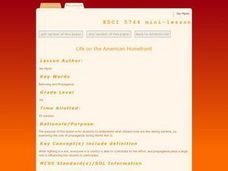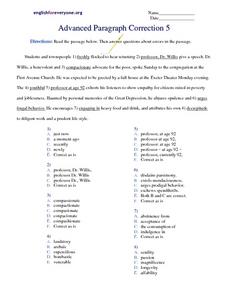Curated OER
Daily Life in Ancient Greece
Sixth graders discover what everyday life was like for Ancient Greeks. In this Greek history instructional activity, 6th graders examine the cultural diversity of Ancient Greece and how it affected daily life for its citizens.
Curated OER
Social and Cultural Issues in the Civil Rights Movement
Learners watch videos, listen to speeches and analyze the information that is presented about the civil rights movement. They examine visual art of the period.
Curated OER
"It's a Serious Game"
Students explore online safety by viewing an educational video. In this online identification lesson plan, students discuss the importance of keeping personal information private and when it is appropriate to enter personal information...
Curated OER
Britishness
Pupils view and analyze the film "Island People" and discuss the portrayal of 1940s working Britain. They watch and analyze the film, then in small groups write and present a pitch and script for a short film that explores the concept...
Curated OER
Global Issues
Students explore the ways that local, national, and global events are interconnected. They identify current issues at a local and global level, identify organizations that seek to improve conditions in other countries, and examine the...
Curated OER
Growing Up
Students examine the definitions of philantrophy and common good. They identify non-profit organizations in their community and research organizations that existed in colonial times with the same goal in mind. They create a timeline for...
Curated OER
An Anecdote is Worth a Thousand Pictures
Students identify anecdotes in speeches and the purposes that politicians use the anecdotes for. They create personal anecdotes for the class to hear, and students decide if the anecdote is real or fabricated.
Curated OER
Hector's World - Heros
Students read the the story Heroes in order to navigate the Internet safely. In this Hector's World lesson, students examine the importance of checking with an adult before participating in the online environment. Students explore other...
Curated OER
What We Can Learn From Oral History
Students read oral history accounts of the 1930s and 1940s from "The Greatest Generation" books. They discuss how the common good and civil society was strengthed by these men and what they did for America. They research another time...
Curated OER
Something Beautiful This Way Comes
Students interview senior citizens in their community about their role in helping others. They compare notes with one of their classmates to see the different ways they have helped the world. They invite their senior citizen to talk to...
Curated OER
Reaching Out to the Community -- Beyond
Students identify the differences between common good and community capital. They discover their responsibility to contribute to the greater good. They write a letter and design a poster to promote their ideas.
Curated OER
Social Programs and Government Responsibility
Students compare and contrast two Presidents and how viewed the government in times of difficulty. They examine what role each President handled the role of philanthropy during their years in office. They identify acts of philanthropy...
Curated OER
Personal History
Fourth graders gain an appreciation of knowledge about recent history by interviewing senior citizens. They summarize their interviews and organize them into a written presentation.
Curated OER
The Duties of Governments: Dix vs. Pierce
Students examine the role of Dorothea Dix on behalf of people with disabilities. They discuss President Pierce's veto of legislation she helped create. They address the rights and responsibilities of citizen's and the role of government.
Curated OER
Life on the American Homefront
Seventh graders examine the conditions of the homefront during World War II. Using propaganda, they discuss its role and how it affected people who viewed it. They identify the role citizens played during the war and create their own...
Curated OER
Letters
Students read letters the could have been written by Robert E.Lee and his friend John giving students an ideas of what students from a different era thought of George Washington. They discuss history from a child's view point.
Curated OER
Community Foundations and Procedure
Students research a foundation in their community and how it helps its citizens. They form a youth advisory committee and make recommendations to the mock boards of directors. They practice using parliamentary procedure to complete their...
Curated OER
Center Stage -- Focus on the Elderly
Students role play and identify the perspectives of senior citizens. They develop a plan on how to interact with the elderly successfully. They examine children's books on how to relate to the elderly.
Curated OER
Jazz Festival
Sixth graders answer a list of questions giving a price list using their addition, multiplication, division and subtraction skills. They use a worksheet based on the Jazz Fest.
Curated OER
A Woman's Crusade: Dorothea Dix
Students examine the life and reform efforts of Dorothea Dix on behalf of people with disabilities. They also examine the role of women in the 1840s and 1850s. They discover different sources of examples of citizen's rights.
Curated OER
The Bill Of Rights And The News
High schoolers investigate the concepts related to the Bill Of Rights. They conduct research using a variety of resources and focus upon the human rights provided in the legislation. Students read a news article and reflect the upon the...
Curated OER
Aluminum Altruism
Young scholars explore the value of recycling. They consider the importance of giving back to their school community. They calculate their earnings using multiplication and addition.
Curated OER
Good or Bad Fire?
Students discover that fire is useful but it can be also dangerous. They observe a good and bad picture to which they determine if it's an example of a good or bad fire; giving reasons for their answers and recording their comments...
Curated OER
Advanced Paragraph Correction #5
In this paragraph correction worksheet, students read a paragraph about a man giving a speech. Students correct 8 errors by choosing the proper answer from 6 choices.

























